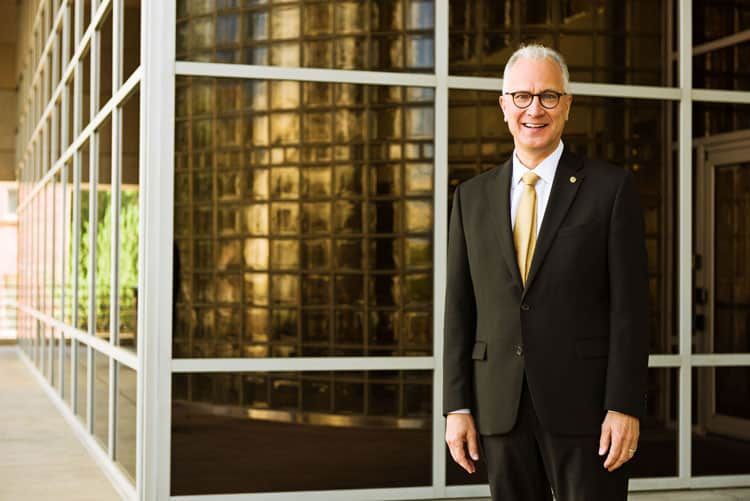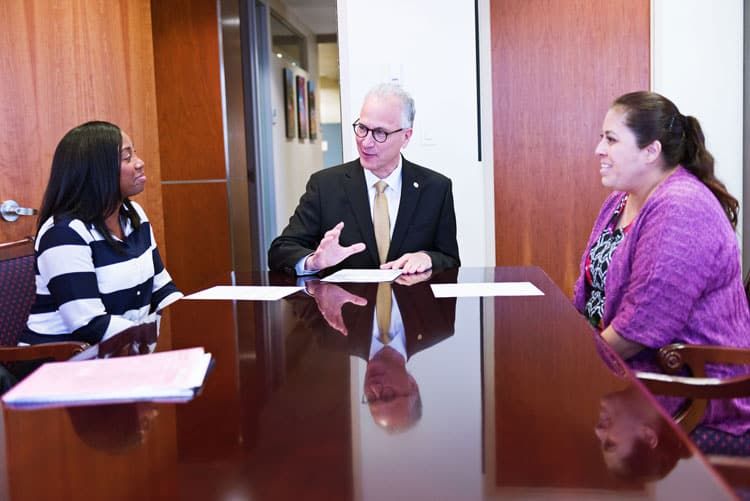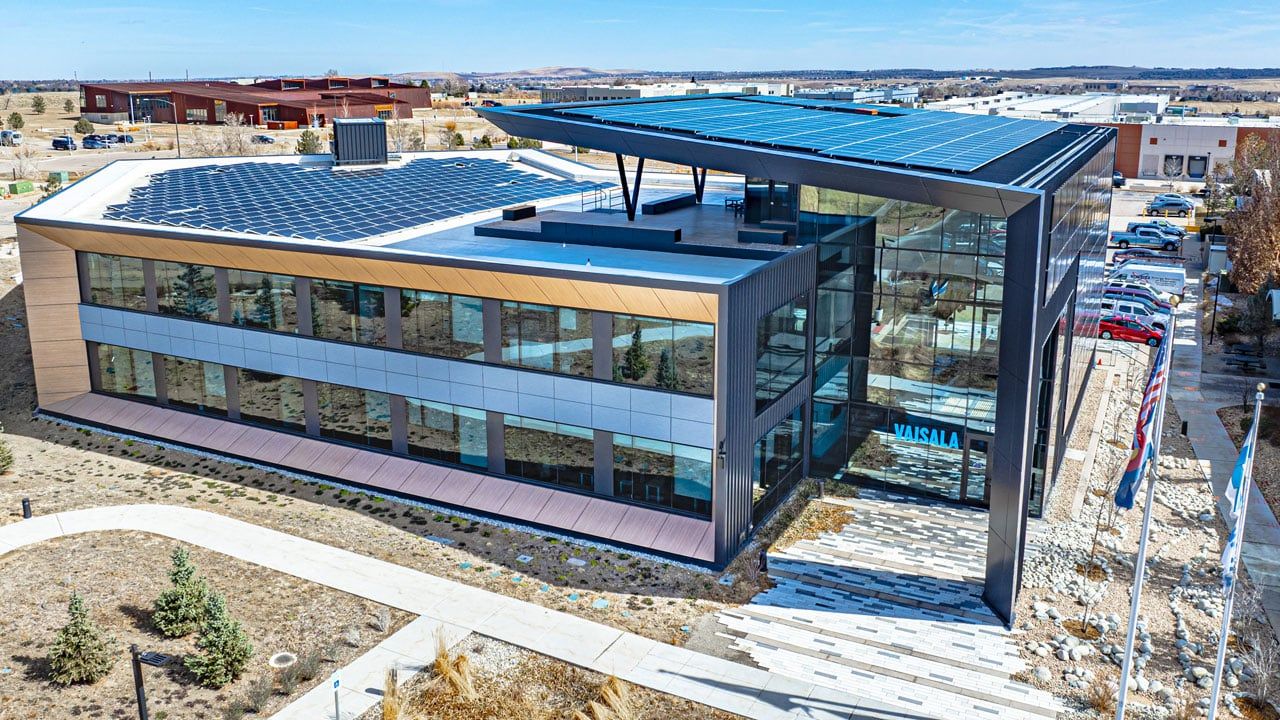CU prez leverages business background

DENVER — New University of Colorado system president Mark Kennedy, a former businessman and congressman, plans to leverage the qualities and knowhow that made him a successful executive to ensure CU graduates are well positioned to thrive in the ever-evolving labor market.
“There’s a number as aspects from the business world that inform my approach to higher education,” Kennedy said when he sat down with BizWest in late July at his office in Denver for a conversation about his first month on the job, his vision for the system and preparing young people for jobs that have yet to be invented. “First and foremost: Quality and authenticity matter in business, in education and in life.”
The CU system includes the flagship campus in Boulder, campuses in Denver and Colorado Springs, and the CU Anschutz Medical Campus in Aurora. In total, the system serves more than 67,000 students. The CU system includes 35,000 employees and a $4.8 billion annual budget.
SPONSORED CONTENT
Commercial Solar is a big investment, but not an overwhelming one
Solar offers a significant economic benefit for commercial property owners while also positively impacting the environment and offering a path to compliance for new municipal requirements like Energize Denver. A local, experienced solar installer will help you navigate the complexities of commercial solar to achieve financial success for your project.
“It’s a fabulous system with four fabulous universities,” Kennedy said. “The more I have a chance to learn about it, the more impressed I am.”
Kennedy, a 62-year-old Minnesota native, took over the position from former CU president Bruce Benson in early July. His three-year contract includes an annual salary that starts at $650,000 and jumps to $850,000 in June 2020.
Like in the business world, “there are waves of the digital revolution that are sweeping over higher education,” he said. “You really need to lean into that if you want to elevate and succeed.
He added: “You need to keep up with the demands of consumers,” which, in the university system’s case, are both students and the companies that will employ those students when they enter the workforce.
During Kennedy’s business career, he was an executive for Federated Department Stores, which became Macy’s. As a Pillsbury Co. executive, he helped lead the charge to acquire ice cream giant Häagen-Dazs. In 2010 he founded consulting and advisory firm Chartwell Strategic Advisors LLC.
“It’s a very competitive space in the retail industry. If you’re Macy’s, how do you differentiate yourself from Kohl’s or Target?” Kenney asked rhetorically. Leaders of colleges and universities must ask themselves a similar question: Is CU providing the type of value for students that allows it to stand out from all of the other institutions in the region?
“It’s about finding a slice, a position, where you can connect with people, where you can be special,” he said.
Kennedy’s higher education resume includes a recent stint as the president of the University of North Dakota and as the director of George Washington University’s Graduate School of Political Management.
Sandwiched between Kennedy’s lives in business and in higher education is his time in Washington. Kennedy, a Republican, represented Minnesota in the U.S. House of Representatives from 2001 to 2007.
Kennedy did not have the luxury of slowly acclimating himself to his new role at CU. From before he was appointed, his candidacy faced skepticism from some within the university — students, faculty, certain regents — who questioned how a former Republican congressman who had staked out conservative positions on social issues could represent a diverse — and often quite progressive — university system.
Ultimately, Kennedy was hired on a 5-4 party-line vote.

Kennedy said he’s ready to move forward with the task of leading and unifying a university system that fosters success for all students and faculty.
“When you look at enrollment since 2009, so much of the growth of the student body has been made up of less represented minorities and Pell Grant [recipients],” he said. “The students who are coming up through high school are going to be increasingly diverse. So the need to embrace a wide cross section of backgrounds and beliefs is essential. If that’s something we’re not going to be good at, we’re not going to be the impactful university that we’ve always been.”
Kennedy, the board of regents, and other CU leaders recently headed west to Tabernash for a retreat to begin developing a new strategic vision for the schools.
“At the retreat, we talked a lot about the concept of the ‘fourth industrial revolution,’ which includes artificial intelligence, the internet-of-things, cloud computing, 5G communication networks,” he said. “This is going to transform the workplace. We want to make sure we are one of the top places companies look to for talent to work in those transformed places.
“More than half of today’s students coming out of high school are going to work in a job in their lifetime that hasn’t been created yet. They’re going to need some special skills, creativity and critical thinking.”
The health care and biotechnology industries are exploding in Colorado, and CU is well positioned to take advantage of industry growth. From chemical research in labs in Boulder to groundbreaking medical device design at Anschutz, “this is increasingly an economic driver when you think of innovation and business that are spawned,” Kennedy said.
Kennedy also pointed to aerospace technology — particularly at the Boulder and Colorado Springs campuses — as an industry sector where Colorado has emerged as a worldwide leader.
“At each [of the system’s four schools], we have innovative research activities that are going to help make Colorado’s economy be an even more vibrant economy,” he said.
CU’s nurturing technology transfer environment allows for students and staff to take an idea, turn it into a research project, take that research and develop a product, create a company and ultimately secure funding and capital.
“We have a whole network of collaboration that I think it is critical to continue to grow,” Kennedy said. “Our charge is to build these ecosystems.”
DENVER — New University of Colorado system president Mark Kennedy, a former businessman and congressman, plans to leverage the qualities and knowhow that made him a successful executive to ensure CU graduates are well positioned to thrive in the ever-evolving labor market.
“There’s a number as aspects from the business world that inform my approach to higher education,” Kennedy said when he sat down with BizWest in late July at his office in Denver for a conversation about his first month on the job, his vision for the system and preparing young people for jobs that…
THIS ARTICLE IS FOR SUBSCRIBERS ONLY
Continue reading for less than $3 per week!
Get a month of award-winning local business news, trends and insights
Access award-winning content today!


